英语常用修辞格
英语常用修辞格复习

常用修辞格复习(定义并例证各术语) 一、使用语音手段的修辞格1.Alliteration(头韵):2.Assonance(元韵):3.Consonance(辅韵):4.Onomatopoeia(拟声):5.Aposiopesis(跳脱):6.Apostrophe(呼告):7.Pun(双关):二、使用词汇手段的修辞格1.Simile(明喻)2.Metaphor(隐喻)3.Transferred epithet(移就)4.Personification(拟人)5.Oxymoron(矛盾修辞法)6.Allusion(典故)7.Analogy(类比)8.Allegory(讽喻)9.Synecdoche(提喻)10.Euphemism(委婉语)11.Metonymy(借代)12.Parody(仿拟)13.Hyperbole(夸张)14.Irony(反语)15.Pun(双关)16.Antonomasia(换称)17.Synaesthesia(通感)18.Understatement(低调陈述)19.Zeugma(轭式搭配)20.Syllepsis(一笔双叙)21.Anticlimax(突降)22.Climax(层进)三、使用句法手段的修辞格1.Loose sentence(松散句)2.Periodic sentence(圆周句)3.Antithesis(对偶句)4.Parallelism(排比句)5.Repetition(反复)6.Ellipsis(省略)7.Inversion(倒装)8.Rhetorical question(反问句)A General Review on Figures of SpeechIdentify the figure(s) of speech used in the following sentences.1. "Your Heavens, give me that patience, patience I need!" (Shakespeare)2. Finally, brethren, whatever is true, whatever is honorable, whatever is right, whatever is pure, whatever is lovely, whatever is of good repute, if there is any excellence and if anything worthy of praise, let your mind dwell on these things. (The Bible)3. We felt strong, smug, secure.4. Return to her?…No, rather I abjure all roofs, and choose…To be a comrade with the wolf and owl…(Shakespeare)5. "One of my kids wrote four-letter words in his composition," the teacher said.6. When I was a child, I used to speak as a child, think as a child, reason as a child; when I became a man, I didaway with childish things. (The Bible)7. And do whate'er thou wilt, swift-footed time,To the wide world and all her fading sweets;But I forbid thee one most heinous crime. (Shakespeare)8. All are not apostles, are they? All are not prophets, are they? All are not teachers, are they? All are not workers of miracles, are they? (The Bible)9. Now, what advantage do we derive from hearing a man say that he has shaken off the yoke, that he does not believe that there is a God who watches over his actions, that he regards himself as sole judge of his conduct, and that he does not think of accounting for it to anyone but himself? Does he imagine that by saying this he is encouraging us to feel great confidence in him in the future and to expect comfort, advice, and help from him in the difficult situations of life? Do such men imagine that they have greatly rejoiced us by telling us that they think our soul is only a puff of wind or smoke, and still more by telling us so in an arrogant, self-satisfied tone? Is it a thing to be said cheerily? Is it not rather something to be admitted mournfully as though it were the saddest thing in the whole world? (Pascal)10. Good breeding consists in concealing how much we think of ourselves and how little we think of the otherperson. (Mark Twain)11. Shall the potter be considered as equal with the clay, that what is made should say to its maker, "He did not makeme";or what is formed say to him who formed it, "He has no understanding"? (The Bible)12. Greatness, in the works of architecture, may be considered as relating to the bulk and body of the structure.…Not to mention the Tower of Babel, of which an old author says there were the foundations to be seen in his time, which looked like a spacious mountain…(Joseph Addison)13. Now is the time to rise from the dark and desolate valley of segregation to the sunlit path of racial justice. Nowis the time to open the doors of opportunity to all of God's children. Now is the time to lift our nation from the quicksands of radial injustice to the solid rock of brotherhood. (Martin Luthur King)14. You earn your living and you urn your dead.15. Other things may be seized by might, or purchased with money, but knowledge is to be gained only by study,and study to be prosecuted only in retirement.(Samuel Johnson)16. For ours is the age of four "A's":anxiety, apprehension, agonizing, and aspirin. (James Thurber)17. So will these unattractive and mysterious objects lead to a new world economic order, or will the game beplayed according to the usual industrial rules; from each according to his ability, to each according to his investments?18. 0 soul of mine, will you never be good and sincere, all one, all open, visible to the beholder more clearly thaneven your encompassing body of flesh? Will you never taste the sweetness of a loving and affectionate heart?Will you never be filled full and unwanting; craving nothing, yearning for no creature or thing to minister to your pleasures, no prolongation of days to enjoy them, no place or country or pleasant clime or sweet human company? (Marcus Aurelius)19. It is in art as in morals; no character would inspire us with an enthusiastic admiration of his virtue, if that virtueconsisted only in an absence of vice; something more is required; a man must do more than merely his duty to be a hero.(Joshua Reynolds)20. It is no use doing what, you like; you have, got to like what you do. (W Churchill)21. To be, or not to be; that is the question:Whether 'tis nobler in the mind to sufferThe sting and arrows of outrageous fortune:Or to take arms against a sea of troubles,And by opposing end them…(Shakespeare)22. ... Let them recognize that there are only two kinds of person whom we can describe as reasonable; those whoserve God with all their heart because they have found him, and those who seek him with all their heart because, they have not found him. (Pascal)23. O, who can hold a fire in his handBy thinking on the frosty Caucasus?Or cloy the hungry edge of appetiteBy bare imagination of a feast?Or wallow naked in December snowBy thinking on fantastic summer's best? (Shakespeare)24. Let us be ruthless in our criticism, cruel to personal vanities, indifferent to age, rank or experience if these standin our way. Let all theories be subjected to the bright clear light of practice. (Norman Bethune)25. I Came BackI came back to softness and comfort.I came back to Dr. White's.And I wonder why I ever went away.Because only Dr. White's gives me two kinds of comfort. The supper-comfort of their cotton-wool content that makes them so much softer. And the comfort of a safer, more absorbent towel, with a flush-away design, too,for even more convenience.I tried the rest, but I came back.Isn't it time you came back to Dr. White's?Dr. White's Two kinds of comfort. (Women, Apr. 1977)26. What may be done at any time will be done at no time. (Proverb)27. You might as well expect a leopard to change its spots as expect him to give up smoking.28. He intended to take an opportunity this afternoon of speaking to Irene. A word in time saves nine…(John Galsworthy)29. A little boy came up to his mother. "Ma," he said, "I have something to tell you. My teacher kissed me.”"Well, were you a good boy and did you kiss her back?""Of course not!" he denied indignantly, "I kissed her face.”30. I don't have any rich relations who well leave me money when they die. Whatever I get in life, I'll have to earnby the sweat of my brow.31. Magnus. Frankly, I have been accustomed to regard your President as a statesman whose mouth was the mostefficient part of his head. (Bernard Shaw)32. No longer mourn for me when I am deadThen you shall hear the surly sullen bellGive warning to the world that I am fledFrom this vile world, with vilest worms to dwell…(Shakespeare)33. O what can ail thee, knight-at-arms,Alone and palely loitering?The sedge has withered from the lake,And no birds sing.O what can ail thee, knight-at-arms,So haggard and so woe-begone?The squirrel's granary is full,And the harvest's done. (John Keats)34. O, my luve is like a red, red roseThat's newly sprung in June:O, my luve is like the melodieThat's sweetly played in tune. (Robert Bums)35. His behavior was一but I blush to mention that.36. He had passed many anxious hours before he got the phone call from his daughter.37. Music, when soft voices die,vibrates in the memory一odours, when sweet violets sicken,Live within the sense they quicken. (Shelly)38. Child-bearing, hard work, and constant anxiety were beginning to tell on Mrs Athelny; and sometimes her backached in the evening so that she had to sit down and rest herself. (W. S. Maugham) 39. "Now, sir," said my aunt to Mr. Micawber, as she put on her gloves, "we are ready for Mount Vesuvius, oranything else, as soon as you please.”"Madam," returned Mr. Micawber, "I trust you will shortly witness an eruption…”(Charles Dickens)40. Then the fish came alive, with his death in him, and rose high out of the water showing all his great length andwidth and all his power and his beauty. He seemed to hang in the air above the old man in the skiff. Then he fell into the water with a crash that sent spray over the old man and over all of the skiff. (Hemingway )美文欣赏4 (A formal official Letter)Liao Chengzhi' s Letter to Mr. Chiang Ching-KuoDear brother Ching-Kuo,No one ever expected that a strip of water should have become so vast a distance. It is now 36 years since our brief rendezvous in Nanjing. From our childhood friendship to our chats in the Soviet capital, everything in the past is still alive in my memory. But it's unfortunate that we haven't heard from each other for so many years. Recently I was told that you are somewhat indisposed and this has caused me much concern. Men in their seventies are often afflicted with illness. I sincerely hope that you will take good care of yourself.Over the past three years, our party has repeatedly proposed talks with your party to bury the hatchet and work jointly to accomplish the great cause of national reunification. But you have time and again announced that there should be "no contact, no talks and no compromise", which I think is inadvisable. Considering both the public interests and our close friendship which has lasted for generations, I regard it as my duty to offer some advice which I hope you will consider carefully.The peaceful reunification of the motherland would be a great achievement to be recorded in history. Taiwan is bound to return to the embrace of the motherland eventually. An early settlement would be in the interest of all. The compatriots in Taiwan would be able to live in peace and happiness, the people of all nationalities on both sides of the Taiwan straits would no longer have to endure the pains of separation from their kith and kin, and the elders in Taiwan and those who have moved there from the mainland would all be properly placed and provided for. And this would contribute to the stability of Asia and the Pacific region as well as to world peace. You used to spur yourself on with the axiom: "The interests to be considered should be the interests of all; the fame to be sought should be a fame that would last forever.” If the great cause of reunification would be accomplis hed through your work, you will certainly win the esteem of the nation and the praise of all. You would be doing meritorious service to the country and your name would be inscribed in the temple of fame. It is preposterous to regard such a service as “guilt”. After all, putting up in that tight eastern comer is not a long-term solution. This is of course quite clear for a man as intelligent as you. Hesitation, procrastination or leaving the problem to other days would only lead to difficulty and distress and you, my brother, £®would hardly be able to escape the blame. Moreover, peacefulreunification is entirely an internal affair of China. Those outsiders who talk glibly about it have designs on our Taiwan. This is common knowledge. When a decision needs to be made, irresolution is bound to bring trouble. I hope you will consider this carefully.The Kuomintang, founded by Dr. Sun Yat-sen endured countless hardships and finally overthrew the monarchy and established the republic; numerous revolutionaries advanced wave after wave and laid down their lives for the cause. History has recorded this as a glorious contribution. The Kuomintang and the Communist Party twice cooperated and on both occasions they made tremendous contributions to the country and the nation. We know something about the fast cooperation, led by Dr. Sun Yat-sen, though we were still young at that time. The second cooperation proceeded with your father in the chair and, as participants in it, we should know what it was all about. Though the matter was as complicated as could be, an all-round view of the situation would show that cooperation is beneficial to the country and the nation while division is detrimental to them. Since you are presiding over the administration of Taiwan, you have unshirkable responsibility for the realization of cooperation for the third time. It would be easier to talk the matter over when leaders on both sides used to be schoolmates and close friends who know one another well. I find it really hard for me to subscribe to those views which describe cooperation as "surrender", "humiliating", "suffering losses" or "being duped. In reviewing history or looking forward to the future, one should bear in mind the public interest, the interests of the country and the nation, and use this as the supreme criterion, instead of basing oneself on a party's selfish interests. Such talks as "reunifying China with the Three People's Principles" are regarded by all sensible people as unrealistic, deceptive and self-deceiving. People of¡£ generation know the true meaning of the Three People's Principles quite well and there is no need to argue about it. Neither is there any need to dwell on such assertions as Taiwan's "economic prosperity, democracy and easy livelihood", the truth of which the venerable gentlemen in Taiwan know clearly. For the sake of your party, I would think that if you would take up the historical responsibility and resolutely take part in peace talks to accomplish national reunification as required by time and tide, the two parties would be able to co-exist for a long time to come, supervising each other while joining in the glorious effort to revitalize China. Otherwise how the situation existing in that small corner could be maintained for long? This is a question those who are sensible are already turning over in their minds. It involves the survival and development of the Kuomintang and I hope you will think it over again.I recently read one of your writings in which you expressed "fervent hopes that my father's soul would be able to return to the homeland and be reunited with the forefathers". I was overwhelmed with emotion when I read this. The remains of your father are still placed temporarily at Cihu. After reunification, they would be moved back and buried in the native soil---in Fenghua, Nanjing or Lushan---in fulfillment of your filial wishes. You recently said, "filial devotion should be expanded into national devotion, which means love of the nation and dedication to the country". This is an excellent statement. Why don't you apply it to the great cause of national reunification? As far as the country and nation are concerned, this would be an expression of both loyalty and filial piety. Otherwise how could you account for yourself after your passing away? It is hoped that you would think more about it.Dear brother! Your life has been marked by frustration, which should not be attributed to fate. Everything depends on yourself. The good and ill to be judged in the next thousand years hinge on the decision made in a moment. The present international situation is capricious. Throughout Taiwan people of all strata are talking about their future. Time does not stay and brief is the day. A long night is fraught with dreams; time does not wait for us. I hope you, my brother, would be good at making the choice and repair the house before it rains. Vast is the expanse of sky and water. What are you waiting for, staying away from home?The longing for old friends grows with age. If it is convenient to you, I would pack and set out for a visit to Taibei to seek enlightenment from our elders. "For all the disasters the brotherhood has remained; a smile at meeting and enmity is banished.” When I look towards the distant southern sky, my heart is already there. No word is enough to express what I wish to say. It is hoped that you will take good care of yourself. I am waiting impatiently for a reply.Please convey my regards to your mother as well as to Fang-Liang, Wei-Kuo and the children.Best wishes to you,Liao ChengzhiJuly 24, 1982An informal Letter (A student to a teacher)Prof. ChenMar. 26, 1987I have just received your letter of March 21. 1 was happy to hear that you are well and that you are invited to give lectures in Xi'an Foreign Languages Institute during the summer vacation. How nice it will be to see you again!Things here are going smoothly; and I haven't a thing to be unhappy about. I'd like to thank you heartily for your deep concern about me and great confidence in me.For the next three weeks there will be a general checkup on our teaching work and studies. I have already drawn up a plan with the help of other teachers. According to the requirements of the administration of our university, I intend to do the work in this way:a) Organize two demonstration lessons, one for the first grade teachers, the other for the second grade teachers.b) The teachers will attend each other's classes at least once during the period.c) Organize meetings of students of different grades so as to solicit their opinions and suggestions.The plan is based on the consideration that good experience should be popularized and shortcomings overcome as soon as possible.Please let me have your advice and instructions in regard to this plan.I was very glad to know that you are getting on well with your book. I wish it would come out soon, for I'm sure I can get a great deal from it. I hope you and your wife are enjoying yourselves in Beijing.You say your wife will go to the U. S. next month to see your daughter. Who will take care of you during her one-month stay in the U. S? Don't hesitate to ask Huang Yaping, Qi Min and others for help when you need it.Best wishes,Your student,Ding Xiaoya。
英语修辞种类范文
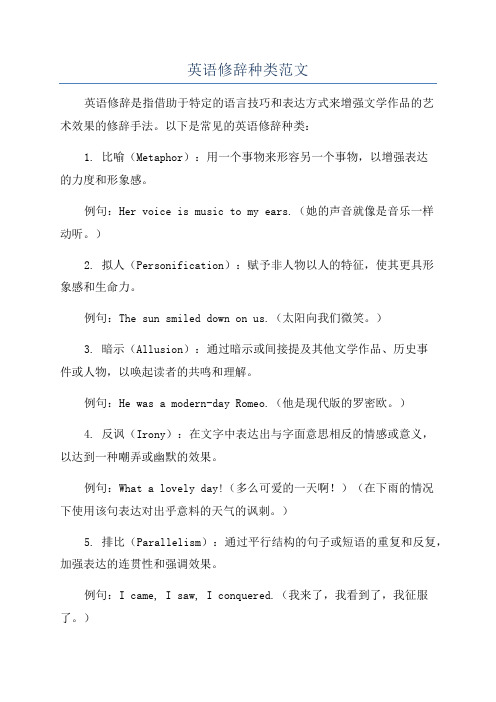
雨水节气的农耕智慧中国农民的雨水利用方法雨水节气的农耕智慧:中国农民的雨水利用方法雨水是农业生产的重要水源之一,尤其对于中国这样一个农耕大国来说,如何合理利用雨水资源对于农民们来说是至关重要的。
在中国的大部分地区,雨水节气是一个重要的农事节点,决定了农民们的田间管理和种植策略。
本文将介绍中国农民历经千年积累的雨水利用方法,展示他们智慧而实用的农耕技巧。
1. 水田灌溉系统水稻是中国的主要粮食作物之一,而对于水稻来说,充足的水源是保证其正常生长的关键。
中国农民采用了一套精细的水田灌溉系统,通过合理的水位控制和水流导向,实现了对水稻田的科学灌溉。
他们利用雨水季节的降雨量,实现多级灌溉,将水分合理地供应到每一块田地上,从而保证了水稻的正常生长。
2. 雨水收集池在雨季来临之前,中国农民会准备好雨水收集池,将雨水有序地储存起来。
这些收集池通常是由土坯或砖石修筑而成,具备良好的防渗透性能。
雨季来临时,农民们将这些池塘打开,及时收集雨水,用以灌溉农田或者家庭生活用水。
这种雨水收集池的利用可以有效利用雨水资源,减少水资源的浪费。
3. 雨水利用于饮水中国的一些地区缺水问题比较突出,而雨季是保证饮水的重要时期。
中国农民会利用各种方式将雨水收集起来,用于日常饮水。
他们可以设置雨水收集罐,将雨水储存起来,并经过简单的过滤处理后进行饮用。
这种利用雨水的智慧帮助农民们解决了饮水困难问题,提高了生活质量。
4. 收集雨水用于灌溉果树和蔬菜中国农民还采用雨水灌溉果树和蔬菜的方法,确保农作物在雨季期间得到充足的水源供应。
他们会利用土坡和沟渠,将雨水引导至果树和蔬菜周围的土壤中,实现灌溉。
同时,他们还会选择适宜的果树和蔬菜品种,以适应雨季的降雨量和湿度,提高产量和质量。
5. 雨水合理种植周期在雨季到来的时候,中国农民会合理调整种植周期,尽可能利用雨水增加作物的生长量。
例如,他们会选择在雨季之前播种,并在雨季期间接收雨水灌溉,以提高作物生长速度和产量。
最新英语修辞格完整版
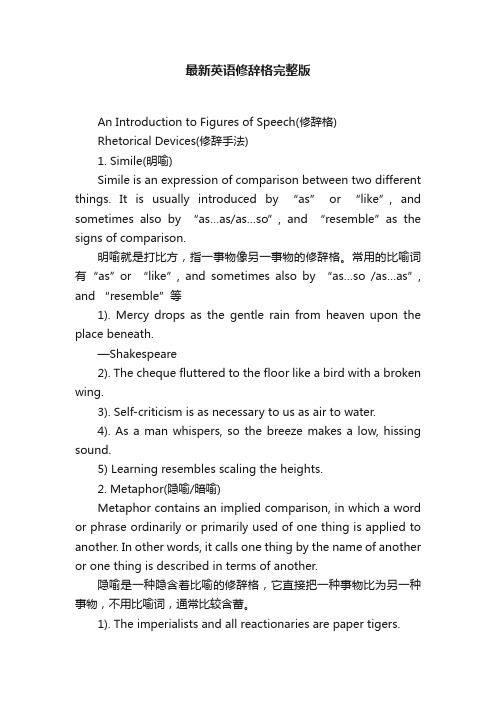
最新英语修辞格完整版An Introduction to Figures of Speech(修辞格)Rhetorical Devices(修辞手法)1. Simile(明喻)Simile is an expression of comparison between two different things. It is usually introduced by “as” or “like”, and sometimes also by “as…as/as…so”, and “resemble”as the signs of comparison.明喻就是打比方,指一事物像另一事物的修辞格。
常用的比喻词有“as”or “like”, and sometimes also by “as…so /as…as”, and “resemble”等1). Mercy drops as the gentle rain from heaven upon the place beneath.—Shakespeare2). The cheque fluttered to the floor like a bird with a broken wing.3). Self-criticism is as necessary to us as air to water.4). As a man whispers, so the breeze makes a low, hissing sound.5) Learning resembles scaling the heights.2. Metaphor(隐喻/暗喻)Metaphor contains an implied comparison, in which a word or phrase ordinarily or primarily used of one thing is applied to another. In other words, it calls one thing by the name of another or one thing is described in terms of another.隐喻是一种隐含着比喻的修辞格,它直接把一种事物比为另一种事物,不用比喻词,通常比较含蓄。
英语的修辞手法有哪些
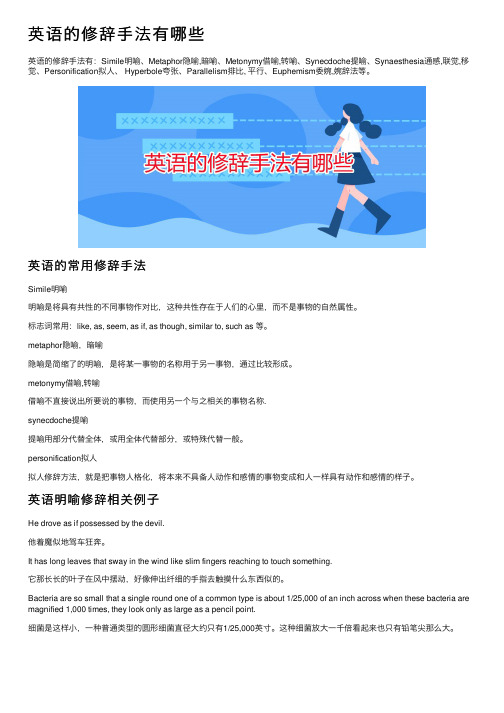
英语的修辞⼿法有哪些英语的修辞⼿法有:Simile明喻、Metaphor隐喻,暗喻、Metonymy借喻,转喻、Synecdoche提喻、Synaesthesia通感,联觉,移觉、Personification拟⼈、 Hyperbole夸张、Parallelism排⽐, 平⾏、Euphemism委婉,婉辞法等。
英语的常⽤修辞⼿法Simile明喻明喻是将具有共性的不同事物作对⽐,这种共性存在于⼈们的⼼⾥,⽽不是事物的⾃然属性。
标志词常⽤:like, as, seem, as if, as though, similar to, such as 等。
metaphor隐喻,暗喻隐喻是简缩了的明喻,是将某⼀事物的名称⽤于另⼀事物,通过⽐较形成。
metonymy借喻,转喻借喻不直接说出所要说的事物,⽽使⽤另⼀个与之相关的事物名称.synecdoche提喻提喻⽤部分代替全体,或⽤全体代替部分,或特殊代替⼀般。
personification拟⼈拟⼈修辞⽅法,就是把事物⼈格化,将本来不具备⼈动作和感情的事物变成和⼈⼀样具有动作和感情的样⼦。
英语明喻修辞相关例⼦He drove as if possessed by the devil.他着魔似地驾车狂奔。
It has long leaves that sway in the wind like slim fingers reaching to touch something.它那长长的叶⼦在风中摆动,好像伸出纤细的⼿指去触摸什么东西似的。
Bacteria are so small that a single round one of a common type is about 1/25,000 of an inch across when these bacteria are magnified 1,000 times, they look only as large as a pencil point.细菌是这样⼩,⼀种普通类型的圆形细菌直径⼤约只有1/25,000英⼨。
(完整版)英语中的修辞手法
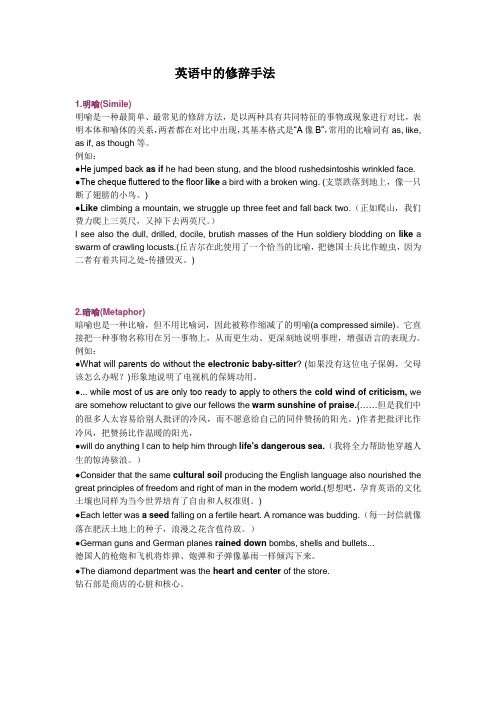
英语中的修辞手法1.明喻(Simile)明喻是一种最简单、最常见的修辞方法,是以两种具有共同特征的事物或现象进行对比,表明本体和喻体的关系,两者都在对比中出现,其基本格式是“A像B”,常用的比喻词有as, like, as if, as though等。
例如:●He jumped back as if he had been stung, and the blood rushedsintoshis wrinkled face.●The cheque fluttered to the floor like a bird with a broken wing. (支票跌落到地上,像一只断了翅膀的小鸟。
)●Like climbing a mountain, we struggle up three feet and fall back two.(正如爬山,我们费力爬上三英尺,又掉下去两英尺。
)I see also the dull, drilled, docile, brutish masses of the Hun soldiery blodding on like a swarm of crawling locusts.(丘吉尔在此使用了一个恰当的比喻,把德国士兵比作蝗虫,因为二者有着共同之处-传播毁灭。
)2.暗喻(Metaphor)暗喻也是一种比喻,但不用比喻词,因此被称作缩减了的明喻(a compressed simile)。
它直接把一种事物名称用在另一事物上,从而更生动、更深刻地说明事理,增强语言的表现力。
例如:●What will parents do without the electronic baby-sitter? (如果没有这位电子保姆,父母该怎么办呢?)形象地说明了电视机的保姆功用。
●... while most of us are only too ready to apply to others the cold wind of criticism, we are somehow reluctant to give our fellows the warm sunshine of praise.(……但是我们中的很多人太容易给别人批评的冷风,而不愿意给自己的同伴赞扬的阳光。
英文中最常见的20种修辞手法(解释例句)
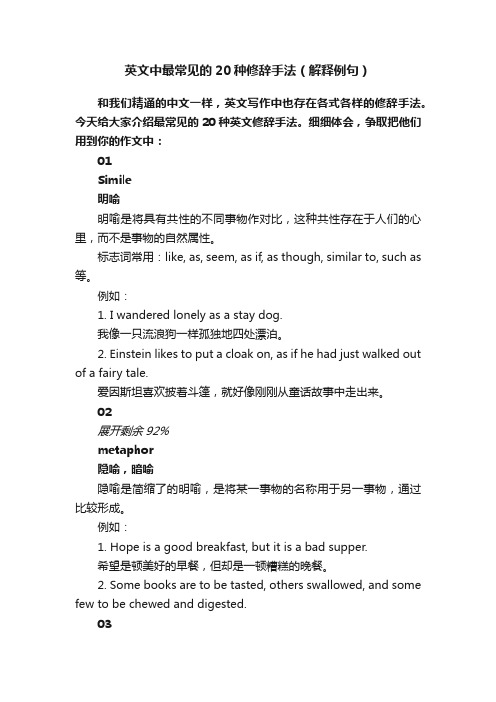
英文中最常见的20种修辞手法(解释例句)和我们精通的中文一样,英文写作中也存在各式各样的修辞手法。
今天给大家介绍最常见的20种英文修辞手法。
细细体会,争取把他们用到你的作文中:01Simile明喻明喻是将具有共性的不同事物作对比,这种共性存在于人们的心里,而不是事物的自然属性。
标志词常用:like, as, seem, as if, as though, similar to, such as 等。
例如:1. I wandered lonely as a stay dog.我像一只流浪狗一样孤独地四处漂泊。
2. Einstein likes to put a cloak on, as if he had just walked out of a fairy tale.爱因斯坦喜欢披着斗篷,就好像刚刚从童话故事中走出来。
02展开剩余92%metaphor隐喻,暗喻隐喻是简缩了的明喻,是将某一事物的名称用于另一事物,通过比较形成。
例如:1. Hope is a good breakfast, but it is a bad supper.希望是顿美好的早餐,但却是一顿糟糕的晚餐。
2. Some books are to be tasted, others swallowed, and some few to be chewed and digested.03metonymy借喻,转喻借喻不直接说出所要说的事物,而使用另一个与之相关的事物名称.1. 以容器代替内容,例如:1)The kettle boils.水开了。
2)The room sat silent.全屋人安静地坐着。
2. 以资料、工具代替事物的名称,例如:Lend me your ears, please.请听我说。
3. 以作者代替作品,例如:a complete Shakespeare莎士比亚全集4. 以具体事物代替抽象概念,例如:I had the muscle, and they made money out of it.我有力气,他们就用我的力气赚钱。
常见的英语修辞
常见的英语修辞常见的英语修辞修辞手法是通过修饰、调整语句,运用特定的表达形式以提高语言表达作用的方式和方法。
修辞不仅仅在中文里很常见,在英文里也是多种多样。
这篇文章里,我们就来谈一谈英文中常见的修辞手法。
1.simile明喻明喻是常用as或like等词将两种不同事物通过比较而连接起来的一种修辞手法。
让我们看几个例子:好的咖啡如同友谊,丰厚,温暖,热烈。
人生就像一罐沙丁鱼,我们大家都在找开启的起子。
他这人就像一只骄傲的公鸡,以为太阳升起是为了它的啼叫。
2.metaphor暗喻暗喻是将两种有共同点的不同事物进行隐晦比较的修辞手法。
明喻与暗喻的不同点就在于是否有出现like或者as(像)这一类比喻词,下面这几个句子都是暗喻:幽默是生活的减震器,它可以鼓舞人们付诸于行动。
时间,你这个小偷。
可是我的心是孤独的猎手,在孤独的小山上狩猎。
3.personification拟人拟人是一种为无生命或抽象物体赋予人类特质与能力的修辞手法。
奥利奥:牛奶最喜爱的曲奇。
大风凛冽,发出怒吼。
这里唯一的怪物就是赌博怪物,它将你母亲沦为奴隶!我叫它赌棍,该把你母亲从他的霓虹灯魔爪下救出来的时候了!4.euphemism委婉语委婉语是使用较委婉含蓄的语言替换强烈冒犯的话语。
这种修辞可能听起来陌生,但在日常生活中的使用频率其实很高。
比如,老人去世的时候我们会采用“过世”、“走了”这一类的话语,这其实就是委婉语。
英文里也有类似的用法,了解委婉语背后真正的含义对阅读英语文章也是很有帮助的哦~下面我们就一起看几个例子:elder citizen老年人(不用old people)pass away逝世(不用die)You've got a prime figure.你的体态丰腴。
(不用fat)5.pun双关语双关语是指利用同词不同义或是同音不同词来制造文字游戏的一种修辞方式。
部分电视剧的幽默效果就是通过双关语来实现的。
生前劳碌奔命,死后化灰入土。
英语常用修辞
英语常用修辞英语作为一门丰富多彩的语言,拥有众多的修辞手法,这些手法能够增强语言的表现力、感染力和说服力,使我们的表达更加生动、形象、有趣。
接下来,让我们一起探索一些常见的英语修辞。
一、明喻(Simile)明喻是一种非常直接的修辞手法,通过使用“像”(like)、“如同”(as)等词将两个不同的事物进行比较,以突出它们之间的相似之处。
例如,“Her smile is like a flower”(她的笑容像一朵花。
)在这个句子中,将笑容和花朵进行比较,形象地描绘出了笑容的美丽和灿烂。
明喻能够让读者或听者更加直观地感受到所描述的事物的特点,使语言更加生动有趣。
再比如,“The old man runs as slow as a snail”(这位老人跑得像蜗牛一样慢。
)通过将老人的跑步速度与蜗牛进行比较,清晰地展现了老人行动的迟缓。
二、暗喻(Metaphor)与明喻不同,暗喻是一种更为含蓄的比较,它不使用“像”、“如同”这类词,而是直接将一个事物说成是另一个事物。
例如,“Time is a thief”(时间是个小偷。
)这里把时间比作小偷,暗示时间会不知不觉地偷走我们的宝贵时光。
暗喻能够使语言更加简洁有力,给人留下深刻的印象。
又如,“The classroom is a zoo”(教室是个动物园。
)形象地表达出教室里的喧闹和混乱。
三、拟人(Personification)拟人是赋予非人类的事物以人类的特征、行为或情感。
比如,“The wind whispered through the trees”(风在树林中低语。
)风本是没有生命的自然现象,但通过“低语”这个人类的动作,使其具有了人的特质,让读者更能感受到风的轻柔。
“The stars danced playfully in the sky”(星星在天空中欢快地跳舞。
)将星星的闪烁描绘成跳舞,充满了活泼和欢乐的氛围。
拟人手法可以让我们对周围的世界产生更加亲切和生动的感受。
英语写作中十种常用的修辞手法初探
英语写作中十种常用的修辞手法初探英语写作中十种常用的修辞手法初探修辞在英语写作中是十分重要的一个写作技巧,合理使用修辞手法能够更好地表达作者的思想,以及提升文章的风格、力度和表达、表述,从而让文章更加有说服力。
今天我们就一起来初探英语写作中十种常用的修辞手法。
首先,比喻法是英语写作中重要的修辞手法,它可以通过把两个意义相近的事物进行比较来表达作者的思想,从而更容易引起受众的共鸣。
比如:Her teeth were like pearls shining in moonlight. 那么,我们可以通过这句话连接上贝壳的发亮,来形象地展示出女主的牙齿也是非常闪耀的,这就是典型的比喻法使用。
其次,夸张法是英语写作中常用的修辞手法。
它可以把相关元素进行放大,以致凸显兩者之间的差异,从而更强烈地表达作者的思想。
比如:The tree was as tall as a skyscraper. 这句话就把这棵树比喻的相当高,这就是夸张法的使用。
第三,借代法也是在修辞法中常用的一种,它可是用一定的代名词或形容词来代替具体的实物,从而更方便的表达作者的思想。
比如:She is a beautiful soul. 这句话是把beautiful soul用代替了她的美:/,这就是借代法的使用。
第四,反复法是用来表达作者的强烈感受的修辞法,它可以重复词语,使句子变得更加强烈。
比如:The wind and the wave and the wave and the wind. 这句话就重复了一句话,一字不差,使得句子变得更加强烈,这就是反复法的使用。
第五,对比法也是英语写作中常用的修辞法,它可以用来对比两个或多个事物的不同,从而使文章更加明朗清晰。
比如:An apple a day keeps the doctor away. 这句话在比较一天吃一个苹果和不吃苹果,从而提示受众要多走动,这就是对比法的使用。
第六,假设法是英语写作中用来暗示受众的情感的修辞法,它可以用一句假设性的句子来表达作者的思想,从而表达出作者的感受。
实用干货:英语中最常用的修辞手法
实用干货:英语中最常用的修辞手法我们在汉语写作中经常为了润色而使用各种修辞,让我们的文章更加生动有趣。
同样,在英语的写作中修辞(figure of speech)也是非常值得学习的一项技能,更是英专的必修内容!今天我们就简单介绍几个常用的修辞手法~1. Simile 明喻明喻是将具有共性的不同事物作对比。
这种共性存在于人们的心里,而不是事物的自然属性。
标志词常用 like, as, seem, as if, as though, similar to, such as 等。
例如:1). He was like a cock who thought the sun had risen to hear him crow.2). I wandered lonely as a cloud.3). Einstein only had a blanket on, as if he had just walked out of a fairy tale.2. Metaphor 隐喻,暗喻隐喻是简缩了的明喻,是将某一事物的名称用于另一事物,通过比较形成。
例如:1). Hope is a good breakfast, but it is a bad supper.2). Some books are to be tasted, others swallowed, and some few to be chewed and digested.3. Metonymy 借喻,转喻借喻不直接说出所要说的事物,而使用另一个与之相关的事物名称。
I、以容器代替内容,例如:1).The kettle boils.水开了。
2).The room sat silent.全屋人安静地坐着。
II、以资料、工具代替事物的名称,例如:Lend me your ears, please.请听我说。
III、以作者代替作品,例如:a complete Shakespeare 莎士比亚全集IV、以具体事物代替抽象概念,例如:I had the muscle, and they made money out of it.我有力气,他们就用我的力气赚钱。
- 1、下载文档前请自行甄别文档内容的完整性,平台不提供额外的编辑、内容补充、找答案等附加服务。
- 2、"仅部分预览"的文档,不可在线预览部分如存在完整性等问题,可反馈申请退款(可完整预览的文档不适用该条件!)。
- 3、如文档侵犯您的权益,请联系客服反馈,我们会尽快为您处理(人工客服工作时间:9:00-18:30)。
常用英语修辞格
明喻(Simile) 明喻是一种最简单、最常见的修辞方法,是以两种具有共同特征的事物或现象 进行对比,表明本体和喻体的关系,两者都在对比中出现,其基本格式是“A像B”,常用的比喻词有as, like, as if, as though 等。例如: ●He jumped back as if he had been stung, and the blood rushed into his wrinkled face.(他往后一跳,好像被什么东西叮了一下似的,他那张布满皱纹的脸顿时涨得通红。) ●The cheque fluttered to the floor like a bird with a broken wing. (支票跌落到地上,像一只断了翅膀的小鸟。)
暗喻(Metaphor) 暗喻也是一种比喻,但不用比喻词,因此被称作缩减了的明喻(a compressed simile)。它 直接把一种事物名称用在另一事物上,从而更生动、更深刻地说明事理,增强语言的表现力。 例如: ●What will parents do without the electronic baby -sitter? (如果没有这位电子保姆,父母该怎么办呢?) ●... while most of us are only too ready to apply to others the cold wind of criticism, we are somehow reluctant to give our fellows the warm sunshine of praise.(……但是我们中的很多人太容易给别人批评的冷风,而不愿意给自己的同伴赞扬的阳光。)
转喻(Metonymy) 是通过相近的联想,借喻体代替本体。例如: ●My 15 students read Emerson, Thoreau, and Huxley.(我的十五位学生读了爱默生、梭罗和赫胥黎的作品。)这是典型的转喻,以人名借代作品。 ●Against the Oval Earth man, the first card I can play is the analogy of the sun and moon. (面对“地球卵形说”者,我能打的第一张牌是,太阳和月亮的相似性。) 文中作者用具体第一张牌来借代抽象的“第一个论据”,更加生动形象,浅显易懂,也使语言新鲜活泼,富有表现力。
拟人 (Personification) 拟人是把人类的特点、特性加于外界事物上,使之人格化的修辞格。例如: ●... four evergreen shrubs stood at each corner,swheresthey struggled to survive the dust and fumes from a busy main road.(……四丛常绿灌木分别位于每个角落,它们忍受着从繁忙的大街上吹来的尘烟,挣扎着活下去。)“挣扎”是有生命的物体的动作,作者给自然的花草赋予了生命,使它人格化。 ●But the houses were cold, closed, unfriendly.(可是那些房子冷漠无情,门窗紧闭,一点也不友好。)house本来是没有感情的,作者通过拟人的手法,表现房子里人的冷漠无情。
夸张(Hyperbole) 夸张是一种故意言过其实,或夸大或缩小事物的形象,借以突出事物的某种特征或品格,鲜明地表达思想情感的修辞方式。用于描写可以使形象更生动突出,渲染气氛,烘托意境, 给读者留下深刻、鲜明的印象。例如: ●Vingo sat stunned, looking at the oak tree. It was covered with yellow handkerchiefs— 20 of them, 30 of them, maybe hundreds.(文戈坐在那儿望着橡树惊呆了。树上挂满了黄手——二十条,三十条,或许几百条。)此句中20 of them, 30 of them, maybe hundreds就是运用夸 张的手法,主观地渲染了气氛 ●She gave me the impression ofshavingsmore teeth, white and large and even, than were necessary for any practical purpose.(她给我的印象是:她有一口洁白整齐的牙为数之多已超过任何实际需要。)在这里作者通过夸张的描述,使一个贪婪好吃的女性形象跃然纸上。
反语(Irony) 英语修辞格irony就是说反话,用反面的话来表达正面的意思。这种修辞格可用来进行 讽刺,但多数是用来表达一种善意的幽默或俏皮,故意说出与本意相反的话,例如: ●Slowly the old lady stooped to pick it (the cheque ) up. Her present, her lovely present. With trembling fingers she tore itsintoslittle bits. (老太太慢慢地弯下腰,把支票从地上捡起来,她的礼物,她的可爱的礼物!用颤抖的手指把它撕得粉碎。)老太太八十岁寿辰那天,急切地盼 望女儿回家看望她,稍稍安慰她那颗孤寂的心,然而盼来的却是女儿的一张冷冰冰的支票, 这当然不是老人心爱的礼物。故此处her lovely present是典型的irony,是句反话。 ●She was not so young as I expected and in appearance imposing rather than attractive.( 她并不如我想象的那么年轻。她的外表与其说吸引人,不如说是令人难忘。)imposing意因为外貌、形体而使人印象深刻,作者在此以讽刺挖苦的口吻来描述一个贪吃而肥胖的女人。
仿拟(Parody) 根据家喻户晓的成语或谚语,临时更换其中的某个部分,造成新的成语或谚语;或者根据古今名言警句,在保持其原句不变的情况下,更换其中部分词语,这种修辞方式叫仿拟例如: ●To lie or not to lie-the doctor's dilemma(撒谎还是不撒谎——医生的难题)看到这个标题,我们不禁想起莎翁戏剧Hamlet中那个永远也解不透的句“To be or not to be, that is the question”。显然,文章的题目由此模仿而来,给人印象深刻。 ●Lady hermits who are down but not out(穷困而不潦倒的女隐士们)文中的down but not out源于down and out,原是拳击比赛的术语,后来喻指穷困潦倒的人
矛盾修辞法(Oxymoron) 用两种不相调和,甚至截然相反的特征来形容一项事物,在矛盾中寻求哲理,以便收到奇警的修辞效果,这就是矛盾修辞法,用这种方法,语言精炼简洁,富有哲理,并产生强大 的逻辑力量,产生一种出人意料,引人入胜的效果。例如: ●A miserable, merry Christmas(悲喜交加的圣诞节)。圣诞节那天,故事主人公小男孩经历了从痛苦的边缘到幸福的顶峰的过程。因此,父母精心安排的圣诞节既是最糟的,又是最好的。
头韵 (Alliteration) 与前面几种修辞方式不同,头韵是一种语音修辞方式,它指一组词、一句话或一行诗中重复出现开头字母相同的单词,常用于文章的标题、诗歌及广告语中,简明生动,起到突出重点,加深印象,平衡节奏,宣泄感情的作用。例如: ●A miserable, merry Christmas ●Profits of praise
1.生动形象的Simile(明喻) 2.含而不露的Metaphor(隐喻) 3.无灵有灵的Personification(拟人) 4.结构精巧的Transferred Epithet(移就) 5.蕴涵新意的Synecdoche(提喻) 6.明抑暗扬的Understatement(低调陈述) 7.闪烁其词的Euphemism(委婉) 8.强化语意的Hyperbole(夸张) 9.含蓄典雅的Allusion(引喻) 10.相映相衬的Antithesis(对照) 11.排迭匀称的Parallelism(平行) 12.发人深思的Paradox(隽语) 13.矛盾统一的Oxymoron(矛盾修饰) 14.妙趣横生的Anticlimax(突降) 15.一唱三叹的Repetition(重复) 16.音律优美的Alliteration(头韵) 17.一语两意的Pun(双关) 18.冷嘲热讽的Irony(反语) 19.趣味盎然的Parody(仿拟) 20.化腐为奇的Zeugma(轭式搭配)
积极修辞(Active Rhetoric Techniques) 它主要指那些有相对固定格式的修辞性写作技巧。常见分类如下: 1词义修辞格 (Lexical Stylistic Devices) metaphor(比喻), metonymy(借代), personification(拟人), irony(反语), hyperbole(夸张), understatement(低调), euphemism(委婉语), contrast(对照), oxymoron(矛盾修辞 法), transferred epithet(移就), pun(双关), syllepsis(异叙), zeugma(粘连), parody(仿拟), paradox(隽语) 2结构修辞格(Syntactical Stylistic Devices) repetition(反复), catchword repetition(联珠), chiasmus(回文), parallelism(平行结构), antithesis(反对), rhetoric question(设问), anticlimax(突降) 3.音韵修辞格 (Phonetic Stylistic Devices) alliteration(头韵), onomatopoeia(拟声)
